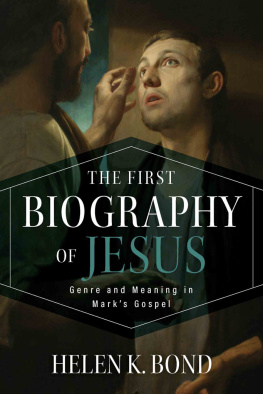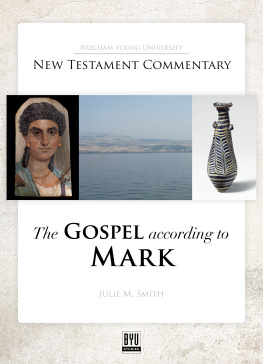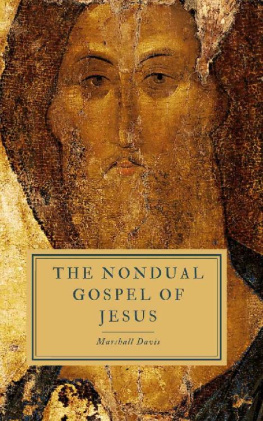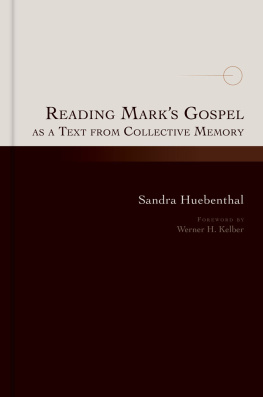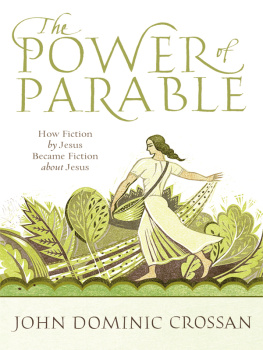The First Biography of Jesus
Genre and Meaning in Marks Gospel
Helen K. Bond
WILLIAM B. EERDMANS PUBLISHING COMPANY
GRAND RAPIDS, MICHIGAN
Wm. B. Eerdmans Publishing Co.
4035 Park East Court SE, Grand Rapids, Michigan 49546
www.eerdmans.com
2020 Helen K. Bond
All rights reserved
Published 2020
262524232221201234567
ISBN 978-0-8028-7460-3
eISBN 978-1-4674-5807-8
Library of Congress Cataloging-in-Publication Data
Names: Bond, Helen K. (Helen Katharine), author.
Title: The first biography of Jesus : genre and meaning in Marks gospel / Helen K. Bond.
Description: Grand Rapids, Michigan : William B. Eerdmans Publishing Company, 2020. | Includes bibliographical references and index. | Summary: Argues that Marks author used the genre of biography to extend the gospel from an earlier narrow focus on the death and resurrection of Jesus so that it included the way of life of its founding figure Provided by publisher.
Identifiers: LCCN 2019050666 | ISBN 9780802874603 (hardcover)
Subjects: LCSH: Bible. MarkCriticism, interpretation, etc. | Jesus ChristBiographyHistory and criticism. | Classical biographyHistory and criticism. | Biography as a literary form. | Jesus Christ
Classification: LCC BS2585.52 .B65 2020 | DDC 226.3/066dc23
LC record available at https://lccn.loc.gov/2019050666
To Keith, Katriona, and Scott
with loveas always
and
Joan Sandra Scott Raffan (19382017)
Looking back, it becomes clear that various kinds of philosophical, spiritual, and ethical Lives are the main artery of ancient biography. It starts with the figure of Socrates, represented as embodying his own ethical teaching, and continues with Hellenistic interest in the life and lifestyle of both ancient sages and contemporary philosophers. The canonical and apocryphal gospels, located at the side of the main Graeco-Roman tradition, are striving towards a complete Life of Jesus, making him a living model as much as a teacher. The ostensibly political Lives of Plutarch are in substance ethical biography, using great historical figures to make clear the consequences in a persons life of virtue and vice. The comic variety, such as the Life of Aesop and Lucians biographical satires, is equally concerned with ethics. Diogenes Laertius shows most interest in the lives of his philosophers, while their doctrines receive more perfunctory treatment. In Late Antiquity, the continuing Pythagorean and incipient Neoplatonic life-writing testify to the persistent centrality of the spiritual kind of biography.
Tomas Hgg, The Art of Biography (Cambridge:
Cambridge University Press, 2012), 387
Contents
M any people have contributed to the writing of this book. Some have changed my thinking in significant ways while others have offered encouragement, support, and friendship along the way.
I would like to thank Michael Thomson at Eerdmans, who had faith in the proposal even when it was little more than a scrappy outline, and latterly Trevor Thompson, who saw it through the press. Richard Burridge has been unfailingly supportive and helpful during this project; thanks especially to him for sharing with me a pre-publication copy of the third edition of What Are the Gospels? Craig Keener, too, has shared my biographical interests, and Im hugely grateful to him for sending me proofs of his excellent new study Christobiography: Memory, History, and the Reliability of the Gospels, now also published by Eerdmans.
In academic life, good colleagues are not always easy to come by, so I feel particularly fortunate to note my thanks to colleagues at Edinburgh, especially the Biblical Studies teamPaul Foster, Matthew Novenson, Philippa Townsend, Larry Hurtado, David Reimer, Timothy Lim, Suzanna Millar, and, most especially, Anja Klein and Alison Jack. Mona Siddiqui keeps me laughing on the Glasgow line and Robert McKay, Louisa Grotrian, and the office staff provide a jovial start to the day. Nathanael Vette put the bibliography into the Eerdmans house style and prepared the indexes, for which Im very grateful. Id also like to thank friends from Classics, especially Lloyd Llewellyn Jones (now of Cardiff), who alerted me to Tomas Hggs brilliant book several years ago, to Sandra Bingham, who kindly read and commented on Chapter 2, and to Kim Czajkowski and Margaret Williams, who remind me there is more to ancient literature than Christian texts. Id also like to thank my fellow editors on the Jesus in the First Three Centuries project (Bloomsbury Academic, 2019)Chris Keith, Christine Jacobi, and Jens Schrterfor making me see that everything, in the end, is reception.
Thanks also go to the various gatheringsscholarly and otherwisewho have heard and commented on the ideas presented here: the research seminars and invited lectures at Edinburgh, Chester, St. Andrews, Exeter, Humboldt University (Berlin), Durham, the Manson Memorial Lecture at Manchester (2017), and SNTS 2018 (Athens); and the more general meetings of the Irish Biblical Association, Aberdeen Theological Society, and the Bishop of Brechins Study Day. Thanks to all of those who asked questions or emailed afterwardeach and every one helped to sharpen my thinking in one way or another.
Most of all, Id like to mention the people who just dont care whether I ever write any books. To my parents, Evelyn and John, for keeping me in Midget Gems and providing an inexhaustible supply of love and stability. To Katriona and Scott, for letting me see the world through your wonderful blend of curiosity, kindness, and general mayhem. And to Keith, for being amazingly supportive and tolerant. A final word goes to my mother-in-law, Joan Raffan, who died while I wrote this. The wifemother-in-law relationship is perhaps one of the most difficult to navigate, but I always felt truly lucky to have you. You will always be in our hearts.
| AB | Anchor Bible |
| ABD | Anchor Bible Dictionary. Edited by David Noel Freedman. 6 vols. New York: Doubleday, 1992 |
| ABG | Arbeiten zur Bible und ihrer Geschichte |
| AJP | American Journal of Philology |
| ANRW | Aufstieg und Niedergang der rmischen Welt: Geschichte und Kultur Rom sim Spiegel der neueren Forschung. Part 1, Von den Anfngen Roms bus zum Ausgang der Republik, and Part 2, Principat. Edited by Hildegard Temporini and Wolfgang Haase. Berlin: de Gruyter 1972 |
| ARW | Archiv fr Religionswissenschaft |
| ASE | Annali di Storia dellesegesi |
| AThR | Anglican Theological Review |
| AYB | Anchor Yale Bible Commentaries |
| BBR | Bulletin for Biblical Research |
| BETL | Bibliotheca Ephemeridum Theologicarum Lovaniensium |
| BHT | Beitrge zur historischen Theologie |
| Bib | Biblica |
| BibInt | Biblical Interpretation |
| BS | The Biblical Seminar |
| BSac | Bibliotheca Sacra |
| BTB | Biblical Theology Bulletin |
| BZNW | Beihefte zur Zeitschrift fr die neutestamentliche Wissenschaft |
| CBET | Contributions to Biblical Exegesis and Theology |
| CBQ | Catholic Biblical Quarterly |
| CR:BS | Currents in Research: Biblical Studies |
| CJ | Classical Journal |
| ClQ | Classical Quarterly |
| DCLS | Deuterocanonical and Cognate Literature Studies |

